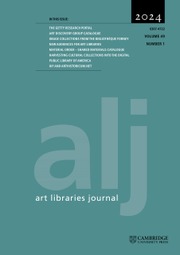Article contents
Open art: MOOCs, copyright and the art librarian
Published online by Cambridge University Press: 06 June 2016
Abstract
Massive Open Online Courses (MOOCs) have transformed the Higher Education sector world-wide, educating diverse audiences through Open Access content and resources. Very few have been integrated into the museum experience; however there is signifi cant potential for MOOCs to revolutionise access to the collections of art museums and galleries. This article presents empirical evidence drawing from a review of literature, and provides a case study into copyright challenges encountered using art images and video in a MOOC environment. Specific examples have been selected from the FutureLearn/ Monash University Creative Coding MOOC launched in June 2014, discussing the role that an Art Librarian plays in this process. This will be of interest to a broader museum and gallery audience, embarking on provision of online educative programs for users.
Information
- Type
- Research Article
- Information
- Copyright
- Copyright © The Art Libraries Society 2015
References
- 1
- Cited by

